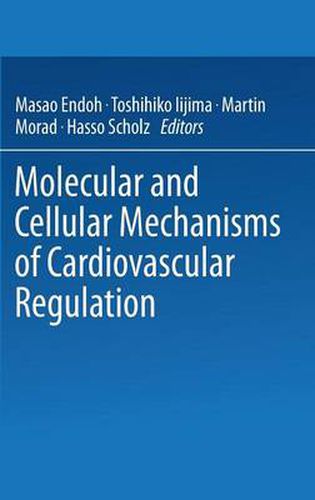Readings Newsletter
Become a Readings Member to make your shopping experience even easier.
Sign in or sign up for free!
You’re not far away from qualifying for FREE standard shipping within Australia
You’ve qualified for FREE standard shipping within Australia
The cart is loading…






This title is printed to order. This book may have been self-published. If so, we cannot guarantee the quality of the content. In the main most books will have gone through the editing process however some may not. We therefore suggest that you be aware of this before ordering this book. If in doubt check either the author or publisher’s details as we are unable to accept any returns unless they are faulty. Please contact us if you have any questions.
This volume contains selected papers presented at the Sendai International Sympo sium on Molecular and Cellular Mechanisms of Cardiovascular Regulation held from May 10-12, 1995, to honor the contributions ofProfessorNorio Taira, Chairman of the Department of Pharmacology (1972-1995), Tohoku University School of Medicine, Sendai, Japan. The Department of Pharmacology at Sendai has a long tradition of significant contribution to the development of drug therapy for cardiovascular diseases. The late Professor Koroku Hashimoto, the predecessor of Professor Norio Taira, first suggested the mode of action of calcium antagonists and their potential usefulness in therapy of ischemic heart disease and hypertension at an early stage of their development. The need for greater understanding of the pathophysiology of cardiovascular dis eases is more critical now than ever before because modern advances in basic and clinical sciences have prolonged the average life expectancy. Using a wide range of molecular and electrophysiological techniques, major advances are occurring frequently in the field of cardiovascular physiology and pharmacology. Such multifaceted approaches are preferred because human cardiovascular diseases are complex, requiring multiple interventions and an in-depth understanding of molecular mechanisms underlying the disease. The first section of this book focuses on molecular mechanisms of ion channel regulation. Eight of ten chapters in this section are devoted to the recent advances in molecular characterization and regulation of various types of potassium channels in cardiac, vascular, and neuronal tissues. A discussion of the structure and function of sodium and calcium channels is also included.
$9.00 standard shipping within Australia
FREE standard shipping within Australia for orders over $100.00
Express & International shipping calculated at checkout
This title is printed to order. This book may have been self-published. If so, we cannot guarantee the quality of the content. In the main most books will have gone through the editing process however some may not. We therefore suggest that you be aware of this before ordering this book. If in doubt check either the author or publisher’s details as we are unable to accept any returns unless they are faulty. Please contact us if you have any questions.
This volume contains selected papers presented at the Sendai International Sympo sium on Molecular and Cellular Mechanisms of Cardiovascular Regulation held from May 10-12, 1995, to honor the contributions ofProfessorNorio Taira, Chairman of the Department of Pharmacology (1972-1995), Tohoku University School of Medicine, Sendai, Japan. The Department of Pharmacology at Sendai has a long tradition of significant contribution to the development of drug therapy for cardiovascular diseases. The late Professor Koroku Hashimoto, the predecessor of Professor Norio Taira, first suggested the mode of action of calcium antagonists and their potential usefulness in therapy of ischemic heart disease and hypertension at an early stage of their development. The need for greater understanding of the pathophysiology of cardiovascular dis eases is more critical now than ever before because modern advances in basic and clinical sciences have prolonged the average life expectancy. Using a wide range of molecular and electrophysiological techniques, major advances are occurring frequently in the field of cardiovascular physiology and pharmacology. Such multifaceted approaches are preferred because human cardiovascular diseases are complex, requiring multiple interventions and an in-depth understanding of molecular mechanisms underlying the disease. The first section of this book focuses on molecular mechanisms of ion channel regulation. Eight of ten chapters in this section are devoted to the recent advances in molecular characterization and regulation of various types of potassium channels in cardiac, vascular, and neuronal tissues. A discussion of the structure and function of sodium and calcium channels is also included.